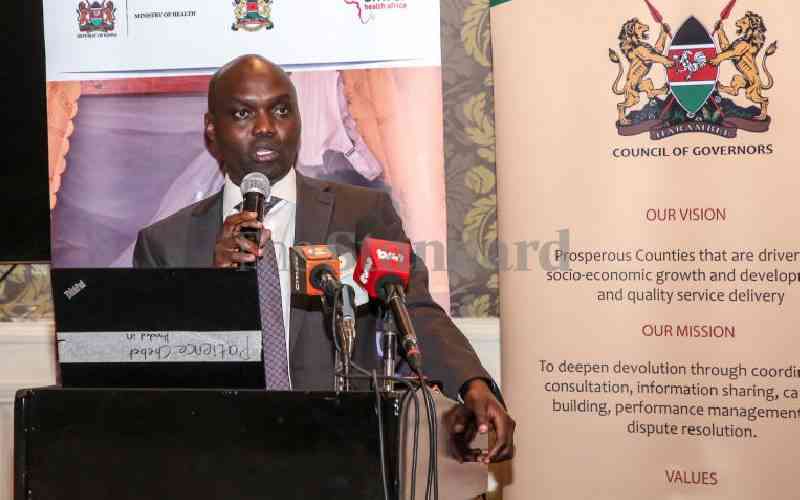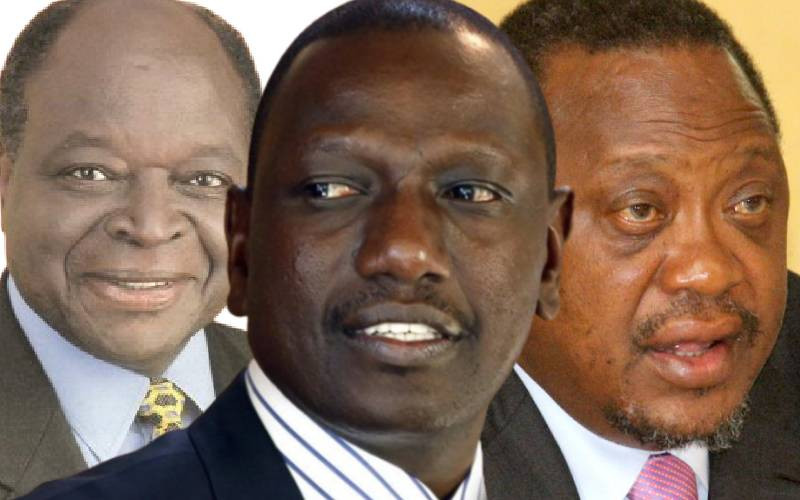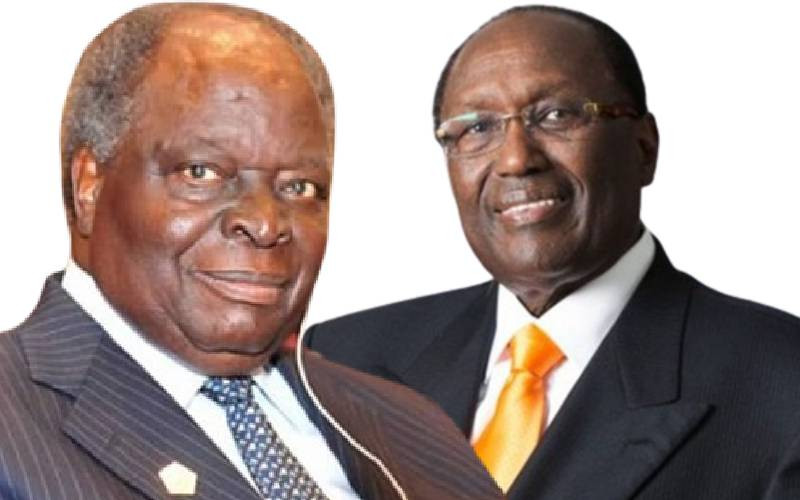 |
|
The Sh500m house State built in Mweiga that retired president Mwai Kibaki is yet to occupy. [PHOTO: MOSE SAMMY/STANDARD] |
By JAMES MBAKA
Kenya: As the country ponders on how to reduce the runaway public sector wage bill, experts warn that unless corruption, bloated workforce and wastage within government are not addressed, the proposed pay cut could make little impact in rescuing the economy.
Skeptics and proponents of the ruling Jubilee alliance’s move to seek pay cut within the civil service to bridge the development deficit also raise the red flag that such a hurried decision would spark discontent and rebellion if politically motivated.
They now want President Uhuru Kenyatta’s administration to address issues of grand corruption and massive wastage within government as long term measures to save for the government’s flagship projects.
The President and his deputy William Ruto announced they will take a 20 per cent pay cut while the rest of the Cabinet will have their pay slashed by 10 per cent in a bid to bring down the ballooning wage bill.
More than 50 per cent of the country’s income is spent on paying salaries for public servants. At Sh500 billion, the country’s public sector wage bill is the highest in the world. There are fears that the situation would be chronic in a few years, meaning no money for development.
Economic analyst Barrack Muluka says the symbolic gesture by the President and his deputy should be replicated across the board to ensure that the government minimises spending on non-priority areas such as entertainment and foreign travel while saving for investment projects to create jobs and spur economic growth.
“If we talk about the President taking a 20 per cent pay cut, he should look around himself and ask how public funds are being spent and how the 20 per cent magic figure will come to play,” Muluka says.
Cosmetic solution
He says the gesture is a step in the right direction, arguing that the 20 per cent magical figure should be extended to allowances paid to state officers and special votes especially at the Office of the President. “If we talk about the President’s entertainment or travelling allowance, that gesture must be extended to those votes that if their funding is slashed, such cannot affect delivery,” Muluka proposed.
But political analyst PLO Lumumba blames the President of seeking cosmetic solutions to what he describes as a more “cancerous problem”. “We are in a situation where chicken are coming home to roost. You cannot water the desert with a teaspoon. But the President, with whom the back stops, is prescribing a banned aid solution to a fundamental and cancerous problem,” he said
PLO says the President must address the fundamental questions surrounding the burgeoning public sector wage bill with fundamental solutions to save the face of the country from imminent meltdown.
The former Anti-corruption czar says part of the remedies to the economic problems lie in adopting prescriptions of the Institute of Economic Affairs’ recommendations made in 2001. In their publication dubbed “Kenya at Crossroads”, the institute put forward steps to address issues of economic stagnation.
Bloated workforce
“We know what the problem is but we are not ready to deal with it, and confront the fanning catalysts of what has turned to be a ridicule of the world’s most devastating wage levels in a low income earning country,” PLO said.
Stay informed. Subscribe to our newsletter
Muluka avers that the government’s failure to address the bloated workforce within departments and ministries was largely to blame for the burgeoning wage bill. He lamented that although the government cut down the number of ministries from the all high of 42 to 18, the downsizing did not reciprocate with the restructuring of government.
“The change at the top was rather cosmetic. Super structures and sub structures remain essentially the same with some six people doing the same job that can be done by one person,” he said. He said the country had not thought through the architecture of devolution, an issue he avers has added to the baggage evolved the country has.
PLO, a constitutional expert, regrets that the drafters of the Constitution delivered to Kenyans a mutilated document that provided for a number of offices which have turned to be a nightmare for the country.
He says the political elite hijacked the constitutional making process at conception and ended up writing a document that overburdened the taxpayer.
“We played politics with the constitution. We thought devolution was a good thing but when the political class met in Naivasha and took the view that we needed to replicate 47 county governments and nominate 400 MCAs, we committed Original Sin,” he says.
National debate
This is a concern shared by Turkana South MP James Lomenen Ekonwa who says the drafters of the Constitution failed to tell Kenyans the monetary cost in the implementation of devolution.
“We could have been told how much it could take to pay the new offices created under the new Constitution so that Kenyans could carry out a comparative analysis of the costs before deciding whether they would adopt devolution or not,” he told The Standard on Sunday.
He also proposes that the provincial administration should be abolished to cut down on the wage bill. “We have five or six people doing the same job that can be done by one person. We do not see the meaning of DCs and DOs when the county governments have posted sub-county and ward administrators,” he said.
ODM opposed the public servants pay cut to reducing the wage bill. The party called for a national debate on taxation of wages and asked for quick action in six areas that could reduce the wage bill to ensure more money is left for development projects.
It proposed a merger of provincial administration with county governments, eradication of corruption, limiting luxurious expenditures, job creation, eradication of insecurity and support of SMEs as viable options that if explored would help reduce the wage bill by a far bigger margin.
Even as former President Mwai Kibaki keeps off the State-financed Sh500 million Mweiga home, he is this week expected to move into Sh250 million office block purchased for him by the Government.
The new office block for Kibaki and his staff is at Nyari Estate, Nairobi. His personal secretary, Prof Nick Wanjohi explained the “final touches are being done and we will invite you sometime soon to open it. May be sometime this week.”
From this house, Kibaki will carry out his official functions and receive visitors. “It has taken long to acquire it because of stringent procurement laws. But we are satisfied with the building,” said Wanjohi.
Originally, the Treasury had allocated Sh700 million for the new offices in the 2012/2013 financial year, but Parliament brought down this figure to Sh250 million following public outcry.
“Parliament approved Sh250 million for purchase of office for the former President. We recently paid Sh230 million for an office in Nyari and spent the remaining Sh20 million on refurbishing the offices,” said Kibaki’s aide on condition of confidentiality so as not break the protocol rules around the retired leader.
“President Uhuru Kenyatta will visit the office for the first time on Monday (tomorrow),” he added.
He also revealed Kibaki has been appointed by UN as its Water Ambassador and this office will partly help execute his new goodwill mandate.
“He had been invited to New York in March but he decided not to travel in respect of austerity measures Government has proposed,” added our other source.
Never used
Separately The Standard on Sunday established the former President has never used his palatial house in Mweiga, which was paid for by the taxpayer, preferring to use his houses in Muthaiga Estate, Nairobi, and his rural home in Nyeri.
Since the house was completed sometime last year, neither Kibaki nor any of his family members have spent a night there.
The last time Kibaki was at the residence was when he presided over a graduation at the nearby Dedan Kimathi University on May 17, last year.
“He came for like 45 minutes and chatted with employees. Although the initial brief we received was that he was likely to spend the night there,” a source said.
He said the brief meeting was held at the balcony facing the Nyeri-Nyahururu highway. “When he was leaving he joked with the workers: Nitarudi tu hivi karibuni (I will be back soon). He then got into his limousine and was driven away,” the source confided.
Former Housing Minister Soita Shitanda said the idea of building the former President a house was never discussed at the Cabinet and was never brought to his attention. “I have no idea who approved it because to the best of my knowledge, it was never discussed in the Cabinet. I don’t remember it passing through my ministry either. I just heard like everyone else that the Government had built a multi-million shilling house for Kibaki in the media,” explained Shitanda.
Secretary to the Cabinet, Mr Francis Kimemia who was head of Public Service when the house was constructed said he could not comment on the reasons why Kibaki had not moved to the new house.
The house is magnificent, and an imposing architectural piece of work. Its view from the Nyeri-Nyahururu road is resplendent with red tiles making it stand out from any other building nearby.
It is tucked inside an indigenous forest, which shields it from clear view. But since its construction was completed three years ago, movement into the 100-acre land where it stands has been restricted with stern elite General Service Unit (GSU) officers keeping guard.
Even those neighbouring the farm have not had the privilege of accessing the home and have only been left to view it from a distance since a six-metre high perimeter wall was erected even before the construction started.
Original team
The house also has an electric fence around it and apart from the outer six-metre brick wall; the main house is surrounded by another brick wall.
At any given time, according to our source, five members of the squad are assigned to guard the gates leading into the compound while a team of 15 domestic workers is assigned other duties inside the compound.
Our month-long investigations revealed that a team of ten GSU officers headed by a Chief Inspector guards the residence.
A group of five is assigned a 12-hour shift and always shuttle between Kibaki’s Kanyange rural home and the Mweiga residence.
According to our source, the original team assigned to guard the home comprised 12 officers but two are currently on training in Magadi.
Apart from the GSU officers, the house has a retinue of servants, gardeners and housekeepers, who report daily for work and are under government payroll.
An attempt by The Standard on Sunday to gain access into the compound was warded off by GSU sentries who told us visitors are not allowed without express authority from the family of the former President.
“There were a few things which had not been fixed including some plumbing but these are now in place. But I’m not sure if the contractor has handed over the project to the Government as required,” said another source who works in the house.
The employee who declined to be named for fear of being seen discussing confidential matters said the house has a swimming pool and a Jacuzzi.
The worker said the residence has also a health club and an in-house canteen for entertaining guests.
Latest fitting
“The residence also houses an office wing complete with a waiting lounge. There is also a guest wing on the left hand side and houses for the security guards near the main entrance,” added the source.
“A solar water heating system is one of the latest fittings to be installed in the expansive house,” the employee said.
Apart from the main residence, there are two double-bedroomed units for senior managers and a block of six houses for security personnel.
An extra block of another six houses for domestic workers is adjacent to the senior manager’s office. Painting an illustrative picture of how the residence is lavishly furnished, the worker said the manicured lawns and flower beds are tended to daily by a group of workers.
There is also a foyer and a large open ground behind the house for meetings. The area with manicured grass can accommodate between 400-500 guests.
But true to his character, Kibaki rarely spends a night in his rural home even when in Nyeri. During his presidency, he would preside over a function in Nyeri and drive back to Nairobi or fly to Sagana State Lodge for the night.
 The Standard Group Plc is a
multi-media organization with investments in media platforms spanning newspaper
print operations, television, radio broadcasting, digital and online services. The
Standard Group is recognized as a leading multi-media house in Kenya with a key
influence in matters of national and international interest.
The Standard Group Plc is a
multi-media organization with investments in media platforms spanning newspaper
print operations, television, radio broadcasting, digital and online services. The
Standard Group is recognized as a leading multi-media house in Kenya with a key
influence in matters of national and international interest.
 The Standard Group Plc is a
multi-media organization with investments in media platforms spanning newspaper
print operations, television, radio broadcasting, digital and online services. The
Standard Group is recognized as a leading multi-media house in Kenya with a key
influence in matters of national and international interest.
The Standard Group Plc is a
multi-media organization with investments in media platforms spanning newspaper
print operations, television, radio broadcasting, digital and online services. The
Standard Group is recognized as a leading multi-media house in Kenya with a key
influence in matters of national and international interest.









